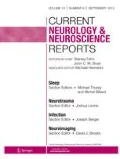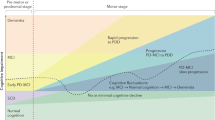Abstract
Dementia associated with Parkinson’s disease (PDD) is a common problem and one that is associated with significant morbidity and mortality. Over the past decade, increasing research efforts and funding have been directed toward an improved understanding of PDD. Despite these efforts, fundamental gaps remain in our knowledge. Consequently, therapeutic progress has been frustratingly slow and incomplete. To significantly affect PDD, novel “disease-modifying” agents, rather than more traditional neurotransmitter replacement approaches, likely will be required.
Similar content being viewed by others
References
Papers of particular interest, published recently, have been highlighted as: •Of importance •• Of major importance
Lohle M, Storch A, Reichmann H: Beyond tremor and rigidity: non-motor features of Parkinson’s disease. J Neural Transm 2009, 116:1483–1492.
Lewis SJ, Foltynie T, Blackwell AD, et al.: Heterogeneity of Parkinson’s disease in the early clinical stages using a data driven approach. J Neurol Neurosurg Psychiatry 2005, 76:343–348.
Dorsey ER, Constantinescu R, Thompson JP, et al.: Projected number of people with Parkinson disease in the most populous nations, 2005 through 2030. Neurology 2007, 68:384–386.
Zesiewicz TA, Sullivan KL, Hauser RA: Nonmotor symptoms of Parkinson’s disease. Expert Rev Neurother 2006, 6:1811–1822.
Hely MA, Morris JG, Reid WG, Trafficante R: Sydney Multicenter Study of Parkinson’s disease: non-L-dopa-responsive problems dominate at 15 years. Mov Disord 2005, 20:190–199.
Emre M: Dementia associated with Parkinson’s disease. Lancet Neurol 2003, 2:229–237.
Parkinson J: An Essay on the Shaking Palsy. London: Sherwood, Neely and Jones; 1817.
Foltynie T, Brayne C, Barker RA: The heterogeneity of idiopathic Parkinson’s disease. J Neurol 2002, 249(2):138–145.
Marras C, Lang A: Invited article: changing concepts in Parkinson disease: moving beyond the decade of the brain. Neurology 2008, 70(21):1996–2003.
• Aarsland D, Bronnick K, Larsen JP, et al.: Cognitive impairment in incident, untreated Parkinson disease: the Norwegian ParkWest Study SYMBOL. Neurology 2009, 72:1121–1126. This article highlights cognitive impairment in early, untreated people with PD and compared with age-matched controls. This study is peerless in design and size.
•• Hely MA, Reid WG, Adena MA, et al.: The Sydney multicenter study of Parkinson’s disease: the inevitability of dementia at 20 years. Mov Disord 2008, 23:837–844. This highly influential article highlights the burden of nonmotor complications in advanced PD, particularly dementia.
• Buter TC, van den Hout A, Matthews FE, et al.: Dementia and survival in Parkinson disease: a 12-year population study. Neurology 2008, 70:1017–1022. Based on cumulative dementia incidence from the Stavanger cohort, this article provides useful graphs illustrating how dementia risk is dominated by current age.
Aarsland D, Kurz MW: The epidemiology of dementia associated with Parkinson disease. J Neurol Sci 2010, 289(1–2):18–22.
Burn DJ, Rowan EN, Allan LM, et al.: Motor subtype and cognitive decline in Parkinson’s disease, Parkinson’s disease with dementia, and dementia with Lewy bodies. J Neurol Neurosurg Psychiatry 2006, 77:585–589.
•• Emre M, Aarsland D, Brown R, et al.: Clinical diagnostic criteria for dementia associated with Parkinson’s disease. Mov Disord 2007, 12:1689–1707. This is a useful review of the neuropsychological and neurologic profile of PDD, coupled with proposed criteria for the diagnosis of dementia associated with PD.
Dubois B, Burn D, Goetz C, et al.: Diagnostic procedures for Parkinson’s disease dementia: recommendations from the Movement Disorder Society Task Force. Mov Disord 2007, 22(16):2314–2324.
Mahieux F, Fenelon G, Flahault A, et al.: Neuropsychological prediction of dementia in Parkinson’s disease. J Neurol Neurosurg Psychiatry 1998, 64:178–183.
Lewis SJG, Foltynie T, Blackwell AD, et al.: Heterogeneity of Parkinson’s disease in the early clinical stages using a data driven approach. J Neurol Neurosurg Psychiatry 2005, 76:343–348.
Hobson P, Meara J: The detection of dementia and cognitive impairment in a community population of elderly people with Parkinson’s disease by use of the CAMCOG neuropsychological test. Age Ageing 1999, 28:39–43.
•• Kulisevsky J, Pagonabarraga J: Cognitive impairment in Parkinson’s disease: tools for diagnosis and assessment. Mov Disord 2009, 24:1103–1110. This is a masterful review of existing instruments used to assess cognitive impairment in PD, with a helpful critique and recommendations.
Athey RJ, Porter RW, Walker RW: Cognitive assessment of a representative community population with Parkinson’s disease (PD) using the Cambridge Cognitive Assessment-Revised (CAMCOG-R). Age Ageing 2005, 34:268–273.
Riedel O, Klotsche J, Spottke A, et al.: Cognitive impairment in 873 patients with idiopathic Parkinson’s disease. Results from the German Study on Epidemiology of Parkinson’s Disease with Dementia (GEPAD). J Neurol 2008, 255:255–264.
Llebaria G, Pagonabarraga J, Kulisevsky J, et al.: Cut-off score of the Mattis Dementia Rating Scale for screening dementia in Parkinson’s disease. Mov Disord 2008, 23:1546–1550.
Marinus J, Visser M, Verwey NA, et al.: Assessment of cognition in Parkinson’s disease. Neurology 2003, 61:1222–1228.
Pagonabarraga J, Kulisevsky J, Llebaria G, et al.: Parkinson’s disease—cognitive rating scale (PD-CRS): a new cognitive scale specific for Parkinson’s disease. Mov Disord 2008, 23:998–1005.
Nazem S, Siderowf A, Duda JE, et al.: Montreal cognitive assessment performance in patients with Parkinson’s disease with “normal” global cognition by mini-mental state examination Score. J Am Geriatr Soc 2009, 57:304–308.
Hoops S, Nazem S, Siderowf AD, et al.: Validity of the MoCA and MMSE in the detection of MCI and dementia in Parkinson disease. Neurology 2009, 73:1738–1745.
Edison P, Rowe CC, Rinne JO, et al.: Amyloid load in Parkinson’s disease dementia and Lewy body dementia measured with [11C]PIB-PET. J Neurol Neurosurg Psychiatry 2008, 79:1331–1338.
•• Braak H, Del Tredici K, Rub U, et al.: Staging of brain pathology related to sporadic Parkinson’s disease. Neurobiol Aging 2003, 24:197–211. The authors describe a highly influential pathologic staging system with applicability to PDD. Although not without criticism, this system is the framework on which many subsequent studies have been based.
Rajput AH, Voll A, Rajput ML, et al.: Course in Parkinson disease subtypes: a 39-year clinicopathologic study. Neurology 2009, 73:206–212.
• Parkkinen L, Kauppinen T, Pirttila T, et al.: Alpha-synuclein pathology does not predict extrapyramidal symptoms or dementia. Ann Neurol 2005, 57:82–91. This clinicopathologic study calls the Braak hypothesis into question, particularly with regard to the pathologic basis of dementia.
Friedman J, Vanover KE, Taylor EM, et al.: ACP-103 reduces psychosis without impairing motor function in Parkinson’s disease. Mov Disord 2006, 21:1546.
Litvinenko IV, Odinak MM, Mogil'naya VI, Emelin AY: Efficacy and safety of galantamine (reminyl) for dementia in patients with Parkinson’s disease (an open controlled trial). Neurosci Behav Physiol 2008, 38:937–945.
Oertel W, Poewe W, Wolters E, et al.: Effects of rivastigmine on tremor and other motor symptoms in patients with Parkinson’s disease dementia: a retrospective analysis of a double-blind trial and an open-label extension. Drug Saf 2008, 31:79–94.
Mentis MJ, Delalot D, Naqvi H, et al.: Anticholinesterase effect on motor kinematic measures and brain activation in Parkinson’s disease. Mov Disord 2006, 21:549–555.
• Gill SS, Anderson GM, Fischer HD, et al.: Syncope and its consequences in patients with dementia receiving cholinesterase inhibitors: a population-based cohort study. Arch Intern Med 2009, 169:867–873. This large population-based study highlights possible safety problems related to the use of ChEIs in dementia. These relate to bradyarrhythmias and associated syncope, hip fractures, and hospitalization.
Halliday G, Hely M, Reid W, Morris J: The progression of pathology in longitudinally followed patients with Parkinson’s disease. Acta Neuropathol 2008, 115:409–415.
Selikhova M, Williams DR, Kempster PA, et al.: A clinico-pathological study of subtypes in Parkinson’s disease. Brain 2009, 132:2947–2957.
Rowland JP, Rigby J, Harper AC, Rowland R: Cardiovascular monitoring with acetylcholinesterase inhibitors: a clinical protocol. Adv Psychiatric Treatment 2007, 13:178–184.
Leroi I, Overshott R, Byrne EJ, et al.: Randomized controlled trial of memantine in dementia associated with Parkinson’s disease. Mov Disord 2009, 24:1217–1221.
•• Aarsland D, Ballard C, Walker Z, et al.: Memantine in patients with Parkinson’s disease dementia or dementia with Lewy bodies: a double-blind, placebo-controlled, multicentre trial. Lancet Neurol 2009, 8:613–618. The authors report on a well-conducted randomized controlled trial of memantine in PDD (and also DLB).
Creeley CE, Wozniak DF, Nardi A, et al.: Donepezil markedly potentiates memantine neurotoxicity in the adult rat brain. Neurobiol Aging 2008, 29:153–167.
Dickson DW, Braak H, Duda JE, et al.: Neuropathological assessment of Parkinson’s disease: refining the diagnostic criteria. Lancet Neurol 2009, 8:1150–1157.
Disclosure
Dr. Burn serves on medical advisory boards for Teva, Boehringer-Ingelheim, Archimedes, and Merck Serono. He has received honoraria for speaking at meetings sponsored by Teva-Lundbeck, Orion, Boehringer-Ingelheim, GlaxoSmithKline, Novartis, Eisai, UCB, and GE. He also has acted in an advisory capacity for a grant funded by the Michael J. Fox Foundation and has received reimbursement for his time in this capacity. No other potential conflicts of interest relevant to this article were reported.
Author information
Authors and Affiliations
Corresponding author
Rights and permissions
About this article
Cite this article
Docherty, M.J., Burn, D.J. Parkinson’s Disease Dementia. Curr Neurol Neurosci Rep 10, 292–298 (2010). https://doi.org/10.1007/s11910-010-0113-7
Published:
Issue Date:
DOI: https://doi.org/10.1007/s11910-010-0113-7




